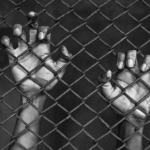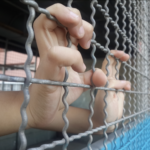Kids Continue to be Locked-Up with Hardened Adult Criminals in Queensland

In early May 2019, the ABC’s Four Corners Program aired The Watch House Files – an expose of Queensland’s practise of detaining children as young as ten years old with hardened and often dangerous adult prisoners in the state’s police watch houses.
The published version of the report states, “murderers, paedophiles and drug addicts are held in maximum security police watch houses, but each year hundreds of children are also locked up in these same facilities”.
The investigative journalists attached to the channel “obtained more than 500 files detailing cases of children who have spent time in Queensland’s watch houses”, 52 of which related to children under the age of 14 years.
The disturbing reports include the case of a 12-year old girl who spent nine days in one of these facilities, a pregnant 16-year old girl who spent 34 days and a boy “aged under 14” who spent 34 days.
It detailed the terror faced by these children who were often put together with “some of society’s most dangerous criminals”.
The ‘justification’
The reason given for such an appalling and dangerous breach of the state’s duty of care to children was that youth detention centres were overcrowded, and could not take in any more kids.
The uproar
The public outrage following the program’s airing was palpable, with people from all walks of life joining youth advocates, human rights organisations and public interest groups in calling the situation “appalling” and calling for it to be swiftly addressed.
At the time, the Law Council of Australia released a statement titled “Adult watch houses no place for children” calling for “[u]gent action… to end the unacceptable practice of detaining children in adult watch houses in Queensland”.
The Council’s then President, Arthur Moses SC, stated:
“The ABC’s Four Corners program, which showed children as young as 10 being locked up – sometimes for weeks – in adult facilities in Queensland, was deeply concerning and must not be ignored”.
“Remanding children in such facilities, in any state or territory, is inappropriate, highly disturbing and represents a grave breach of the duty owed by governments to children in their care. This practice exposes some of society’s most vulnerable – our children – to significant trauma and to hardened criminals. It is not consistent with Australia’s obligations under international human rights laws and should not be tolerated.”
Solutions offered
Also at the time, Queensland’s Public Guardian, Natalie Siegel-Brown, took it upon herself to inform the state government of her observations and proposals for immediate change.
“I have visited the Brisbane watch house, and seen with my own eyes children who are cold, who are hungry, who haven’t accessed any real outdoor air for two weeks or more, and who have little or no access to education. Some are being held in these conditions for weeks at a time”, she stated, adding:
“There are solutions available right now, which I have already recommended to Government.”
“The solutions that would provide immediate change include:
- Temporary, immediate accommodation at youth detention centres. While temporary structures are certainly not ideal, anything has to be better than the travesty of holding kids in the conditions of a watch house.
- Transporting kids from the watch house each day to and from Brisbane Youth Detention centre, where they can at least access fresh air, proper health care, appropriate education and psychological support.”
“At very least, we need to regulate how kids are managed in a watch house – so that they have the same human rights as kids under youth justice legislation. This means rules around using isolation, access to family and all the basics that we require in a youth detention centre.”.
“Remember, these are children as young as 10 or 11. Almost none have been convicted of a crime – they are simply on remand. Many of them have no place to be bailed because they are homeless – or because we as a society have failed to take care of our children.”
“In many cases their charges are minor. I am seeing children being held in watch houses for days for crimes as small as shoplifting. Many are facing charges for what could only be called survival crimes.”
“I do know that many communities are impacted by youth crime. However as a society we need to acknowledge and tackle the issues facing many of these children. Labelling these kids as criminals only makes a crime of their trauma, of their disability, of their suffering.”
Promise of change
In the face of the uproar, the Queensland government promised to implement measures including those proposed by Ms Siegel-Brown as a matter of urgency and assured the public that the days when children would continue to be locked up with dangerous criminals would be numbered.
But the public’s outrage slowly but surely subsided over the ensuing months, and indeed years, and the modest actions taken by the government have certainly not lived up to the promises.
Three years on
Fast forward to 2022 and the state’s youth detention centres continued to be severely overcrowded – with modest government investments into their expansion and improvement failing to yield results in the context of ever-toughening bail laws which. police state. have led to more children being refused bail and remanded in custody for longer.
In one recent case, the Children’s Court of Queensland heard that a girl who was arrested in Innisfail in Queensland, could not be transferred to the Cleveland Youth Detention Centre in Townsville because no beds were available. She was therefore kept in the Innisfail watch house together with adults.
And she’s just one of many. According to Townsville police, 24 youths were arrested there during the week and several more on the weekend, and tough bail laws mean many more children are detained in custody rather than released on bail, as they would likely have been in past years.
Little has changed
So, it seems little has changed.
The focus of the Queensland government – and indeed other governments across Australia – continues to be on punitive measures rather than prevention, diversion and rehabilitation when it comes to youths and youth offending.
The state has failed in adhering to its promise of ensuring that children are not placed in the unacceptable – indeed ‘appalling ‘ – situation of being locked up with hardened adult criminals – a state of affairs that lead to lasting mental harm and even physically endanger some of our most vulnerable and impressionable.
The ‘tough on crime’, ‘lock’em up and throw away the key’, ‘teach them a lesson’ approach has failed time and again, both here and abroad, and it’s certainly time for a shift towards addressing underlying issues that can lead children down the wrong path – such as poverty, lack of housing, abuse in the home, inadequate education, rather than continue with popular yet ineffective methods focused on punishment.
Shifting the focus and taking real steps to support children, divert them away from the criminal justice system and keep them out of harms way has proven time and again to be far more effective at reducing crime and reoffending than locking them away, especially when the latter approach is coupled with anxiety, fear and abuse.






